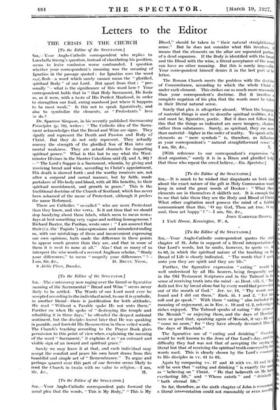Letters to the Editor
THE CRISIS IN THE CHURCH
[To the Editor of the SPECTATOR.] SIR,—Your Anglo-Catholic correspondent who replies to Lucebella Strong's question, instead of elucidating his position, seems to leave confusion worse confounded. I question whether your correspondent's meaning was the meaning of Ignatius in the passage quoted : for Ignatius uses the word aae, flesh—a word which surely cannot mean the " glorified, spiritual Body " of our Lord. But apart from that : " per- sonally "—what is the significance of this word here ? Your correspondent holds that in " that Holy Sacrament, He feeds us, as it were, with a taste of His Perfect Manhood, in order to strengthen our frail, erring manhood just where it happens to be most weak." Is this not to speak figuratively, and also to symbolize the elements, as " Protestants " love to do ?
Dr. Sparrow Simpson, in his recently published -Sacramental Principles (p. 70), writes : " The Catholic idea of the Sacra- ment acknowledges that the Bread and Wine are signs. They signify and represent the Death and Passion and Body of Christ. But they do not only represent. They actually convey the strength of the glorified Son of Man into our mortal weakness. They are actual channels for imparting spiritual power." What is this but to say what the West- minster Divines in the Shorter Catechism said (Q. and A. 96) ? —" The Lord's Supper is a Sacrament, wherein, by giving and receiving bread and wine, according to Christ's appointment, His death is showed forth ; and the worthy receivers are, not after a corporal and carnal manner, but by faith, made partakers of His body and blood, with all His benefits, to their spiritual nourishment, and growth in grace." This is the traditional doctrine of the Church of Scotland, which has never been ashamed of the name of Protestant, although it prefers the name Reformed.
There are Catholics " so-called " who are more Protestant than they know, and vice versa. Is it not time that we should stop bandying about these labels, which seem to mean nowa- days at best something very vague and nothing homogeneous ? Richard Baxter, the Puritan, wrote once : " I am assured that their (i.e. the' Papists ') misexpressions and misunderstanding us, with our mistakings of them and inconvenient expressing our own opinions, bath made the difference in these points to appear much greater than they are, and that in some of them it is next to none at all." Alas ! that so many of us interpret the wise words of a revered Anglican scholar, " Study your differences," to mean " magnify your differences " !-






























































 Previous page
Previous page